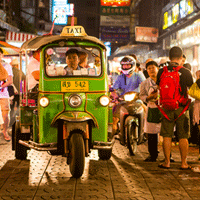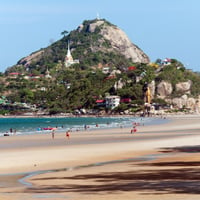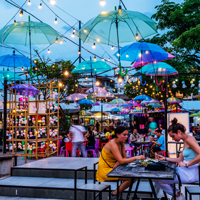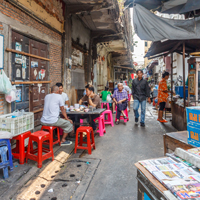Thailand
Coastal BeachesThailand, officially known as the Kingdom of Thailand, is a country in Southeast Asia known for its tropical beaches, opulent royal palaces, ancient ruins, and ornate temples displaying figures of Buddha. It is bordered to the north by Myanmar and Laos, to the east by Laos and Cambodia, to the south by the Gulf of Thailand and Malaysia, and to the west by the Andaman Sea and the southern extremity of Myanmar. Its maritime boundaries include Vietnam in the Gulf of Thailand to the southeast and Indonesia and India on the Andaman Sea to the southwest. Thailand's diverse landscapes range from the mountainous regions of the north to the fertile rice fields of the central plains, the semi-arid farm lands of the northeast plateau, and the rugged coasts along the narrow southern peninsula. The country's culture is heavily influenced by Buddhism, which is practiced by the majority of the population. Bangkok, the capital, is a modern city with a notable cultural heritage, vibrant street life, and iconic temples like Wat Arun, Wat Pho, and the Emerald Buddha Temple (Wat Phra Kaew). Other major cities include Chiang Mai in the north, known for its historic temples and night markets, and Pattaya in the southeast, famous for its resorts and nightlife. Thailand's economy is one of the largest in Southeast Asia, with tourism playing a significant role, alongside exports of goods such as rice, textiles, and electronics. The country is known for its festivals, including the water festival Songkran, and its cuisine, which is characterized by bold flavors and a balance of sweet, sour, salty, and spicy elements. Thailand's natural attractions, including national parks like Khao Yai and marine parks such as the Similan Islands, are major draws for both domestic and international tourists. The country's history is marked by several kingdoms and dynasties, with the current Chakri dynasty having ruled since 1782. Thailand is the only Southeast Asian nation never to have been colonized by a European power, maintaining its independence throughout the colonial period. The nation has a constitutional monarchy, with a long history of political instability and coups, but it remains a popular destination for travelers due to its rich culture, natural beauty, and friendly people.
 SJB Global
SJB GlobalConnect
SJB-Global is a top-rated financial advisory firm specializing in expat financial advice worldwide, offering retirement planning & tax-efficient solutions with a regressive fee model. Our clients benefit from their country’s most favorable tax environment by utilizing the efficient investment vehicles we offer. Our commitment to quality service is reflected in our stellar reviews, with over 300 testimonials boasting 95% five-star ratings.
Click connect to have our partner contact you via e-mail and/or phone.
 SJB Global
SJB GlobalSJB-Global is a top-rated financial advisory firm specializing in expat financial advice worldwide, offering retirement planning & tax-efficient solutions with a regressive fee model. Our clients benefit from their country’s most favorable tax environment by utilizing the efficient investment vehicles we offer. Our commitment to quality service is reflected in our stellar reviews, with over 300 testimonials boasting 95% five-star ratings.
Connect
Click connect to have our partner contact you via e-mail and/or phone.
Living in Thailand
Best Places to Live in Thailand
Visa & Residency
Obtaining a residency in Thailand can be a straightforward process, but it requires careful preparation and adherence to the country's laws. The most common visa for expats seeking long-term residency is the Non-Immigrant Visa “O-A” (Long Stay). This visa is specifically designed for foreigners over 50 years old who wish to retire in Thailand. Applicants must meet financial requirements, such as having a certain amount of money in a Thai bank account or a monthly income or pension. Another option for expats is the Non-Immigrant Visa “B” (Business Visa), which is suitable for those who are employed or are starting a business in Thailand. This visa requires sponsorship from a Thai company and proof of adequate finances. For digital nomads, the Smart Visa is a relatively new option that caters to individuals in specific industries such as technology or startups. The Smart Visa comes in different categories, each with its own set of qualifications and benefits, allowing stays from 1 to 4 years without the need for a work permit. The application process for a Smart Visa involves presenting a viable business plan or employment contract from a qualifying company, and the criteria are quite stringent to ensure that applicants are bringing valuable skills to the country. The process of applying for a residency visa typically involves submitting an application to a Thai embassy or consulate in the applicant's home country. Required documents usually include a passport valid for at least six months, completed application forms, passport-sized photos, and relevant financial evidence. Some visas may also require a medical certificate and a police clearance certificate. Once in Thailand, visa holders must report to immigration every 90 days and may have to renew their visa annually. The difficulty of the process can vary depending on the type of visa and the applicant's circumstances, but with proper preparation and documentation, it can be considered average in terms of complexity compared to other countries. It is highly recommended to consult with the Thai embassy or a legal professional for the most current information and guidance throughout the visa application process.
Healthcare in Thailand
Thailand's healthcare system is a mix of public and private healthcare services. The public healthcare system is overseen by the Ministry of Public Health and provides services to Thai citizens through a universal coverage scheme, which is largely funded by the government. The quality of public healthcare varies, with urban areas typically having better facilities and more resources than rural areas. Private healthcare in Thailand is known for its high quality and is a popular choice for expats and medical tourists, offering state-of-the-art facilities and shorter waiting times. The cost of private healthcare is higher than public healthcare but is still considered affordable compared to Western standards. Expats and digital nomads can access public healthcare if they are employed in Thailand and contribute to the social security system, or they can purchase private health insurance to access private hospitals.
Cost of Living
The cost of living in Thailand is considered moderate, with expenses varying significantly between rural areas and major cities like Bangkok. While housing and food can be quite affordable, especially in smaller towns and the countryside, prices for accommodation, dining, and entertainment in tourist hotspots and the capital city can be higher.
Weather
Thailand has a tropical climate with three distinct seasons: hot, rainy, and cool. The hot season runs from March to June, with temperatures often exceeding 30°C. The rainy season, from July to October, is characterized by heavy monsoon rains and high humidity. The cool season, from November to February, is generally the most pleasant time to visit, with lower humidity and cooler temperatures, though it is still warm by most standards.
Educational System in Thailand
The educational system in Thailand is overseen by the Ministry of Education and is divided into three levels: basic education, vocational education, and higher education. Basic education in Thailand is compulsory and free for all children for 12 years, typically starting at the age of 6. It consists of 6 years of primary education (Prathom 1-6) and 6 years of secondary education, which is split into lower secondary (Mattayom 1-3) and upper secondary (Mattayom 4-6). The school year in Thailand starts in May and ends in March, with a break in October. Thai schools focus on a broad curriculum that includes Thai language, mathematics, science, social science, health and physical education, arts and crafts, and foreign languages. After completing Mattayom 6, students can take the National Education Test to apply for universities. There are also international schools that offer curricula from the United States, the United Kingdom, and other countries, which might be more familiar to expatriate families. These schools typically have grade levels and graduation systems similar to those in their respective countries. The quality of education in Thailand varies, with private and international schools generally offering higher standards and more resources compared to public schools.
Universities in Thailand
The university system in Thailand offers a range of undergraduate, graduate, and doctoral programs. Undergraduate degrees typically take four years to complete, with the exception of some professional degrees such as medicine and architecture, which may take longer. The academic year is usually divided into two semesters, with a possible summer session for certain courses. Thai universities offer programs in various fields, including arts, sciences, engineering, medicine, and business. There are both public and private universities in Thailand, with the former generally being more affordable. Admission to universities is competitive and is often based on entrance examinations and high school performance. For international students, Thailand presents an attractive destination due to its cultural richness and relatively affordable cost of living. Many universities in Thailand offer programs taught in English, particularly at the graduate level. International students may need to provide proof of English proficiency, such as TOEFL or IELTS scores, as part of the application process. Living expenses and tuition fees for international students can vary widely depending on the institution and the program of study. Scholarships and financial aid opportunities are available but may be limited. Foreign students are encouraged to research thoroughly and contact the universities directly for detailed information on programs, fees, and admission requirements.
Copyright 1997-2025 Burlingame Interactive, Inc.














